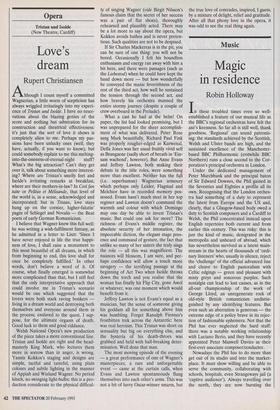Opera
Tristan und Isolde (New Theatre, Cardiff)
Love's dream
Rupert Christiansen
Although I count myself a committed Wagnerian, a little worm of scepticism has always wriggled irritatingly into my experi- ence of Tristan und Isolde. I have no reser- vations about the blazing genius of the score and nothing but admiration for its construction and theatrical effectiveness: it's just that the sort of love it shows is completely alien to me. Perhaps my pas- sions have been unlucky ones (well, they have, actually, if you want to know), but could somebody explain to me this melting- into-the-oneness-of-eternal-night stuff? What's the big attraction? Can't they get over it, talk about something more interest- ing? Where are Tristan's smelly feet and Isolde's irritating remarks at breakfast, where are their mothers-in-law? In Cosi fan tutte or Pelleas et Melisande, that level of the world is, in a sense, acknowledged and incorporated; but in Tristan, love stays hung up on the cornier, higher-falutin' pages of Schlegel and Novalis — the Beat poets of early German Romanticism.
I believe that Wagner knew this full well: he was writing a wish-fulfilment fantasy, as he admitted in a letter to Liszt: 'Since I have never enjoyed in life the true happi- ness of love, I shall raise a monument to this most beautiful of all dreams, in which from beginning to end, this love shall for once be completely fulfilled.' In other words, don't believe a word of it. Of course, what finally emerged is somewhat more complicated than that, but I still feel that the only interpretative approach that could involve me in Tristan's scenario would be one which suggested that the lovers were both stark raving bonkers living in a dream world and destroying both themselves and everyone around them in the process; enslaved to the quest, I sup- pose, for the ultimate orgasm of death. Good luck to them and good riddance.
Welsh National Opera's new production of the piece takes a more conventional line. Tristan and Isolde are right and the head- masterly King Mark, who lectures them more in sorrow than in anger, is wrong. Yannis Kokkos's staging and designs are simple, tactful and tasteful, using plain colours and subtle lighting in the manner of Appiah and Wieland Wagner. No period kitsch, no swinging light-bulbs: this is a pro- duction considerate to the physical difficul- ty of singing Wagner (vide Birgit Nilsson's famous claim that the secret of her success was a pair of flat shoes), thoroughly rehearsed and plausibly acted. There may be a lot more to say about the opera, but Kokkos avoids bathos and is never preten- tious. Such qualities are not to be despised.
If Sir Charles Mackerras is in the pit, you can be sure of one thing: you will not be bored. Occasionally I felt his boundless enthusiasm and energy ran away with him a bit here, and there were passages (such as the Liebestod) when he could have kept the band down more — but how wonderfully he conveyed the manic feverishness of the rest of the third act, how well he sustained the tension through the second act, and how bravely his orchestra manned the entire stormy journey (despite a couple of crew overboard in the Prelude).
What a cast he had at the helm! On paper, the list had looked promising, but I was unprepared for the sheer accomplish- ment of what was delivered. Peter Rose sang Mark beautifully, Richard Paul Fink was properly rougher-edged as Kurwenal, Della Jones was her usual fruitily vivid self as Brangaene (sadly short of breath in 'En- s= wachend', however). But Anne Evans and Jeffrey Lawton, both making their debuts in the title roles, were something more than excellent. Neither has the fqll (i.e. superhuman) Wagnerian armoury which perhaps only Leider, Flagstad and Melchior have in recorded memory pos- sessed. Evans hasn't much steel in her top register and Lawton doesn't command the warmth and colour with which Domingo may one day be able to invest Tristan's music. But could one ask for more? The richness of Evans's middle register, the absolute security of her intonation, the impeccable diction, the elegant stage pres- ence and command of gesture, the fact that unlike so many of her sisters she truly sings the role — all this was magnificent. The nuances will blossom, I am sure, and per- haps confidence will allow a touch more savagery — the terrifying passage at the beginning of Act Two when Isolde throws down the torch and you realise that the woman has finally hit Flip City, gone Awol or whatever, was one moment which would benefit from it.
Jeffrey Lawton is not Evans's equal as a musician, but the sense of someone giving his goddam all for something above him was humbling. Forget Ranulph Fiennes's frostbitten trek across the Antarctic: here was real heroism. This Tristan was short on sensuality but big on everything else, and the hysteria of his death-throes was grabbed and held with ball-breaking deter- mination. Well done that man.
The most moving episode of the evening — a great performance of one of Wagner's masterpieces, a rare and unforgettable event — came at the curtain calls, when Evans and Lawton spontaneously flung themselves into each other's arms. This was not a bit of luvvy Oscar-winner smarm, but the true love of comrades, inspired, I guess, by a mixture of delight, relief and gratitude. After all that phony love in the opera, it was odd to see the real thing again.


























































 Previous page
Previous page